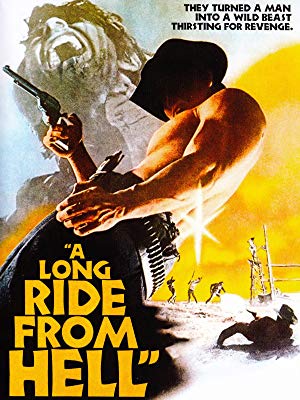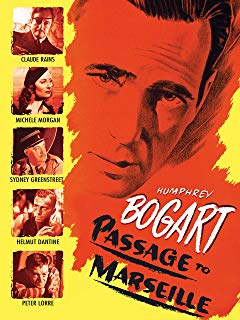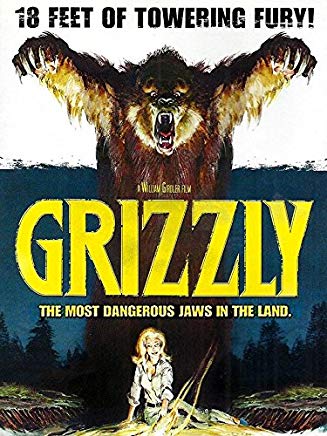 A Long Ride From Hell (1968) – It was filmed in Italy (by an Italian director with a largely Italian cast) in the late ’60s, so it’s very much a technical spaghetti Western, but everything from the star to the costumes to the script (based on an American novel) seems like a throwback to pre-Fistful of Dollars, pre-Django days. Square-jawed, broad-shouldered Steve “Hercules” Reeves is Mike Sturges, is a clean-living horse breeder, who gets framed for a train robbery by the real robbers in cahoots with a crooked sheriff, and sent to brutal Yuma Prison with his little brother, where the attentions of the sadistic warden cause said brother’s demise. Leading an impromptu breakout, Sturges then sets himself to find and kill those who set him up.
A Long Ride From Hell (1968) – It was filmed in Italy (by an Italian director with a largely Italian cast) in the late ’60s, so it’s very much a technical spaghetti Western, but everything from the star to the costumes to the script (based on an American novel) seems like a throwback to pre-Fistful of Dollars, pre-Django days. Square-jawed, broad-shouldered Steve “Hercules” Reeves is Mike Sturges, is a clean-living horse breeder, who gets framed for a train robbery by the real robbers in cahoots with a crooked sheriff, and sent to brutal Yuma Prison with his little brother, where the attentions of the sadistic warden cause said brother’s demise. Leading an impromptu breakout, Sturges then sets himself to find and kill those who set him up.
In contrast to the stubbly and grubby denizens — both villainous and anti-heroic — of other contemporary spaghetti Westerns, Sturges is trim-haired and clean-shaven (except win Yuma, natcherly), and wears prim and tidy clothes (except in Yuma, where he mostly goes shirtless); he talks a lot more, and a lot more properly, than Clint Eastwood or Lee Van Cleef ever did; and while it’s a revenge-driven plot, Sturges is more than willing to let the law do its part when the representatives of the law are upright. He’s a character from the Westerns of a decade prior, wandering around Italy in confusion.
Add to that the workmanlike direction of Camillo Bazzone (best known for… nothing, really), and you have a feature which isn’t “bad,” per se, but I guarantee you can find something better to watch.
 Passage to Marseille (1944) – You gotta hand it to anyone making a WWII movie during the war. I know that there was an element of morale-boosterism in these (what we call “propaganda” when it’s not our side), but looking back on it now, we have a larger narrative to fit any WWII movie into that they just didn’t have.
Passage to Marseille (1944) – You gotta hand it to anyone making a WWII movie during the war. I know that there was an element of morale-boosterism in these (what we call “propaganda” when it’s not our side), but looking back on it now, we have a larger narrative to fit any WWII movie into that they just didn’t have.
This movie, ostensibly about the French Free Air Force based out of England in the latter half of WWII, is really (through flashbacks) about a handful of French convicts in a penal colony who break out of prison explicitly to return and fight for their country. And boy, you better love flashbacks for this movie: The framing story is FFAF Captain Claude Rains meeting with a reporter [cue flashback of Rains rescuing the convicts adrift in the South Pacific [cue flashback of the convicts coming together to escape the penal colony in French Guinea [cue flashback of how a the real protagonist, a Parisian political hothead played by Humphrey Bogart (!), got convicted in the first place]]]. It’s flashbackception!
Props to the script for not making the French noble from stem to stern — the penal colony is shown to be brutal, both to its French convicts and its native laborers, and it seems the French were pretty good at fighting each other even before the Nazis made collaboration a profitable option.
Also, gotta love the cast: Bogart (who, thankfully, does NOT attempt a French accent), Rains (Bogart’s costar from Casablanca), plus Sydney Greenstreet (from The Maltese Falcon) and Peter Lorre (from Casablanca AND The Maltese Falcon). It’s like poker night in wartime Hollywood!
 Grizzly (1976) – My wife saw Grizzly as a wee lass when it first came out (the second half of a drive-in double-bill, maybe?), and it traumatized her, so I waited until an evening when she was out of town to watch it. I am nothing if not a giver.
Grizzly (1976) – My wife saw Grizzly as a wee lass when it first came out (the second half of a drive-in double-bill, maybe?), and it traumatized her, so I waited until an evening when she was out of town to watch it. I am nothing if not a giver.
This is more than just a Jaws ripoff with the word “shark” crossed out and replaced with “grizzly” throughout the script. No, that would have made a much better movie. This is like someone did that with the script for a bad Italian Jaws ripoff (or maybe a prospective Jaws sequel).
Thrill to the spectacle of a 15-foot grizzly bear, quite possibly of an extinct subspecies, showing up in a national park for no reason! It can knock down ranger towers, decapitate horses with a single swipe, and (unlike a shark, which could easily sneak up on terrestrial mammals floating on the surface of the water) sneak up on its pursuers and abysmal bit-part actors with nothing to hide behind but a flimsy bush! (How it could sneak up on anyone is thrown doubly into question, as every bit of footage from the grizzly’s point-of-view — can I call that a “first-ursine viewpoint?” — is accompanied by asthmatic wheezing and rumbling.)
Perfunctory gestures toward characterization don’t help anything; there’s even a love-interest angle for the designated protagonist that sort of peters out from disinterest somewhere in the middle.
But it IS surprisingly gory — a grizzly can’t just pull swimmers below the surface, alas — so one can understand my wife’s bad memories.